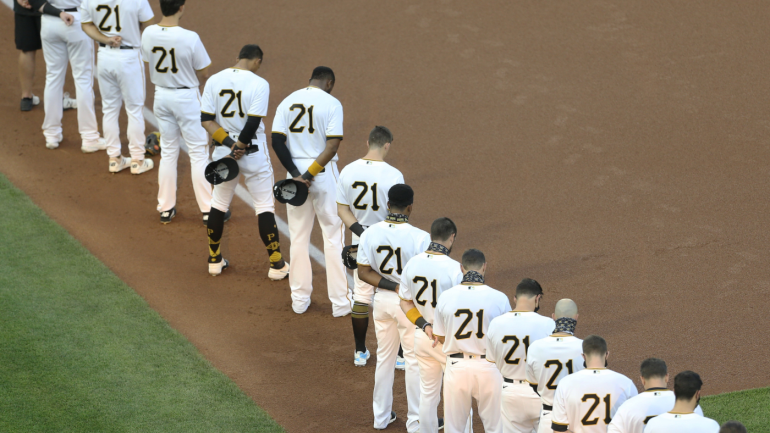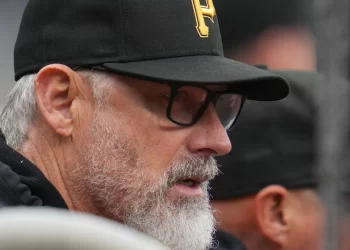By: Zachary Draves
He could hit the ball with sheer beauty whether it was going the opposite way or out of the park. He could throw with such finesse and strength that he can throw a runner out all the way from right field to third base. He could run with reckless abandon as he sought out all the possibilities on the basepaths. He had flash, flair, and focus without those being mutually exclusive. Wherever he went, he won hearts as much as he won accolades with his genuine dedication to the betterment of those around him.
He was #21, right fielder for the Pittsburgh Pirates from 1955-1972. San Juan, Puerto Rico’s native son and beloved icon, Roberto Clemente.

(Courtesy: National Museum of American History)
Immortalized as one of the game’s pioneers as the first major Latino superstar, Clemente heroically hustled his way to such status by playing his way and being authentically himself. Every time he stepped onto the field, he gave the fans what they wanted, which was playing to win no matter the odds or cost.

(Courtesy: Bettman/Getty Images)
As a result, Clemente amassed stellar numbers. His lifetime batting average was .317, had 3,000 hits, 240 HRs, 1,305 RBIs, twelve Gold Glove Awards, and was a fifteen time All Star. He was the National League MVP in 1966 and World Series MVP in 1971.
In Baseball, numbers are routinely prioritized and analyzed, but to David Maraniss, Associate Editor at the Washington Post and author of the book Clemente: The Passion and Grace of Baseball’s Last Hero says that it goes beyond statistics when it comes to Roberto on a practical and personal level.
“His statistics were terrific but I never thought of him in those terms, ” he said. “He was a work of art. The beauty of the way he played was so memorable about him beyond his statistics. Everything about him was cool. He was the coolest player I have ever seen. “
Off the field, he was a vocal social activist who stood up for the rights of marginalized communities, a responsibility that he took very seriously. As a Black Latino man who was routinely belittled by the press for speaking in his native language at times, he was very sensitive to racism and during the height of the Civil Rights movement, he did his part.
He denounced the segregation he experienced while in spring training in Florida that was under the thumb of Jim Crow and was a supporter of Dr. Martin Luther King Jr. He even spent time with him on his farm in Puerto Rico. Clemente also advocated for accommodations for other Black players that were enduring the same type of humiliation with traveling, food, and housing.
It was that public servant spirit that led him to organize relief funds for the people of Nicaragua after they suffered a massive earthquake in December 1972. On New Year’s Eve, he boarded a plane carrying massive amounts of supplies en route to Nicaragua from Puerto Rico.
Tragically, the plane crashed due to engine failure and Clemente perished and his body was never found. He was just 38 years old.

(Courtesy: Youtube)
The impact of his death hit home for the island of Puerto Rico and Latinos everywhere. The trauma of it was parallel to the reaction to the Assassinations of President John F. Kennedy in 1963 and Dr. King and Senator Robert Kennedy in 1968 in the United States. Shock, dismay, public outpouring of grief, and denial.
A man of impeccable pride and character who represented his people with such distinction at a time of rampant discrimination lost his life while trying to do good for others.
Maraniss says that Roberto was the one of a kind athlete that was an everyman who never forgot his humble roots.
“There aren’t that many athletes to sort of take their athletic fame and use it for the betterment of humankind,” he said. “That was his mission his entire life. He was beloved by poor people, the vendors at Forbes Field, the people in Puerto Rico, and the children in Pittsburgh and San Juan.”
One tribute that got lost in history was an obituary that was published by the newspaper of the Black Panther Party. They highlighed Clemente’s support for the Philadelphia chapter and their free breakfast program and health clinics they ran that were major staples in the group’s mission for racial and economic justice.
In historical context, the social impact of Clemente is undeniable and can somewhat compare to that of Jackie Robinson. Both their journeys were in part intertwined. They were both signed by the innovative general manager Branch Rickey, changed the way the game was played and perceived, and both were committed to combating racism. Thus, there has been a concerted push for MLB to retire the #21 on every team just as is the case with the #42.

(Courtesy: Gene J. Puskar/Associated Press)
Maraniss, who is in favor of the idea, said that while Robinson is on another plateau, Clemente is not too far behind.

(Courtesy: USATSI)
“It is hard to compare any other athlete to Jackie Robinson, but if you could find the closest parallel in Roberto Clemente,” he said. “He was proud like Jackie and never gave in to the racists that he encountered during his career.”
It is hard to fathom at how short Roberto Clemente’s life was but he did so much in just under forty years than most do in their lifetime. His impact on the field is evident as the game has become increasingly Latino, with many players holding him in such high regard for paving the way for them.
If he had lived, who knows what he would have done further when it came to baseball, but Maraniss suspects that he would very much be on the frontlines and not just the baselines.
“I think if Clemente were around, he would have gotten more active in terms of politics, ” he said. “He would say there is so much more work to be done. There are still forces out there that don’t understand the entire human kind. He had a universal mindset to view the best in everyone and he would be disappointed in terms of where we are at.”

(Courtesy: AP/REX/Shutterstock.com)
Considering his track record on activism and the present day circumstances around issues of race and immigration, it is hard to imagine someone like Clemente not joining forces with the likes of Colin Kaepernick, LeBron James, and other athletes with a social conscience. For all intents of purposes, he would openly support them and continue to help push society forward.
Fifty years later, Roberto Clemente’s example of strength, service, and sacrifice is one that continues to be felt and emulated by those who want a better world in sports and beyond.
He wouldn’t have wanted it any other way.


 NFL
NFL





